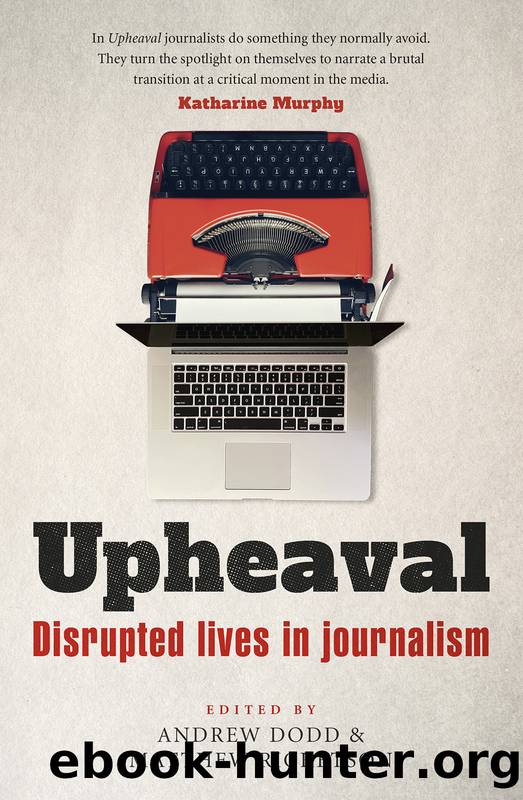Upheaval: Disrupted Lives in Journalism by Andrew Dodd & Matthew Ricketson

Author:Andrew Dodd & Matthew Ricketson [Dodd, Andrew & Ricketson, Matthew]
Language: eng
Format: epub
Tags: Language Arts & Disciplines, journalism
ISBN: 9781742237275
Google: w48ezgEACAAJ
Publisher: NewSouth Publishing
Published: 2021-06-15T23:33:05.423969+00:00
âThe paperâs stance is this and to go further you need to think more about the sort of stories weâre interested in.â That wasnât put to me in any sort of, âYouâve got to start being unfair,â or anything like that. It is, âYou have to think, from your own perspective, what youâre comfortable with, and what you want to be in life, what you want to do.â
The message being sent both explicitly and implicitly in such discussions was that career advancement in this organisation would require Franklin to be comfortable in adopting the organisationâs specific perspective and focus. But Franklin was becoming less comfortable. For example, he had âideological difficultyâ with the Finkelstein Inquiryâs recommendations in 2012 to increase regulation of the news media, and he also had difficulty with the newspaperâs partisan response to them. In particular, he didnât like what he calls personal-agenda-driven journalism.
âYou can read certain newspapers where you donât have to read the opinion pages because theyâre all written by someone with the same opinion or itâs the same column being written again and again and again.â
He recalls his then wife, Caroline Fisher, saying in this period he seemed increasingly tired and not himself. Franklin was also thinking about his family, as Fisher was navigating the move from journalism to academia, which required a PhD qualification. After 28 years at News, a redundancy package would be a circuit breaker from high-pressure work that was wearing on him; it would give time for his passions â gardening and guitar playing â and it would clear their mortgage. The struggle was over his sense of identity. He remembers thinking, âWho am I? ⦠Well, Iâm a journalist. Thatâs what I am. I get stories. I write storiesâ, and in discussions with his wife saying, âIâve just realised Iâm actually a father, Iâm also a husband, Iâm also this, a guitar player.â
The majority who took redundancy packages in 2012 were journalists with around 20 yearsâ experience.4 They had worked hard to establish their reputations, but were still up to two decades from retirement. Franklin was 48 when he took redundancy and Jo Chandler was a similar age but an unwillingness to do things a certain way for advancement was not the predicament she faced.
The kind of journalism to which Chandler was committed was falling out of fashion. Trips to Rwanda or Papua New Guinea to report on complex humanitarian and social issues were expensive and funds for them were drying up, as was interest among senior editorial executives, even though Chandler had won a Walkley Award for such work in 2009.5 She found herself fighting not only for the time to do the stories she deemed important, but avoiding those she thought trivial.
âI would have to enlist some pretty fancy footwork to dodge the daily stuff.â She recalls an idea emanating out of an editorial conference, âWhy donât we send Jo to do colour on the Cup?â âI canât do this again,â she thought. She hated the Melbourne Cup, she hated writing about drunk socialites and she had done this story many years before.
Download
This site does not store any files on its server. We only index and link to content provided by other sites. Please contact the content providers to delete copyright contents if any and email us, we'll remove relevant links or contents immediately.
Crazy Rich Asians by Kevin Kwan(9275)
Small Great Things by Jodi Picoult(7121)
Spare by Prince Harry The Duke of Sussex(5174)
Too Much and Not the Mood by Durga Chew-Bose(4337)
Machine Learning at Scale with H2O by Gregory Keys | David Whiting(4292)
Never by Ken Follett(3937)
Harry Potter 02 & The Chamber Of Secrets (Illustrated) by J.K. Rowling(3665)
I'll Give You the Sun by Jandy Nelson(3428)
Fairy Tale by Stephen King(3369)
The Ultimate Backcountry Survival Manual by Aram Von Benedikt; Editors of Outdoor Life;(3255)
Reminders of Him: A Novel by Colleen Hoover(3088)
The Man Who Died Twice by Richard Osman(3070)
Fantastic Beasts and Where to Find Them: Illustrated edition by J.K. Rowling & Newt Scamander(3013)
Will by Will Smith(2906)
The One Memory of Flora Banks by Emily Barr(2856)
Beautiful Disaster 01 by Jamie McGuire(2787)
Harry Potter and the Deathly Hallows (7) by J.K. Rowling(2714)
Never Lie: An addictive psychological thriller by Freida McFadden(2574)
Hooked: A Dark, Contemporary Romance (Never After Series) by Emily McIntire(2544)
